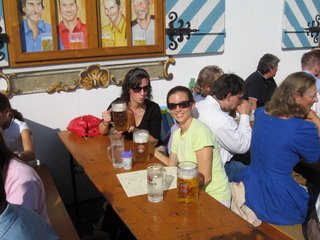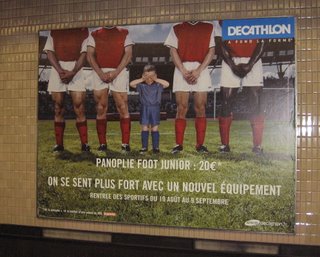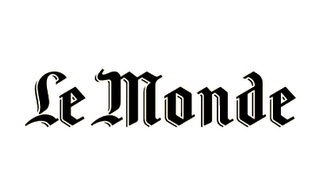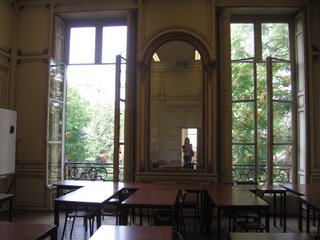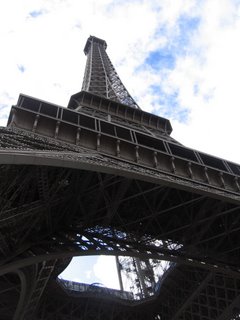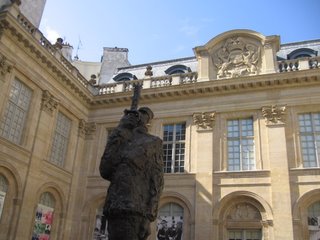Today was the first day I went for a real street run here – until now, I’ve confined myself to parks and the banks of the Seine while I got more familiar with the city. When I run the Seine, there are always a few other runners – usually older men, and there are sometimes a few in the parks as well.
Yay, running.

There is a huge 10k race from the Jardin des Tuileries next Sunday morning (I had sadly already missed the registration deadline by the time I found out about it), and all the posters have pictures of hundreds and hundreds of runners taking to the streets. Where they might all be training for this run is beyond me.
Parisians are a thin people, despite the incredible richness of French food and the lack of a big “gym culture” like there is in the United States. I just can’t figure out what they all do for exercise – because they apparently do not run in the streets.
When I got up this morning, I charted myself a six-mile street run on Google Maps, down Canal St. Denis, along the Seine, around Hôtel de Ville and back up to Gare de L’Est. In the maybe an hour I was out, I saw all of one other runner – a middle-aged man who was, of course, running along the Seine. I haven’t been able to put my finger on the running etiquette here yet either. At home, you always smile and nod or wave when you pass another runner – when I waved to my fellow Seine jogger, he just stared at me until I passed him.
Running along the canal was a strange experience. It seems like people just don’t run the streets here – in fact, pedestrians were kind of hostile when I ran around them. Nobody would let me pass them on the sidewalks, so I ended up doing most of my run in the bike lane in the street.
Maybe this is just because I haven’t figured out how the running scene works yet, but it seemed like seeing a street runner was such a novelty for these Parisians that they didn’t know how to respond. I felt like everyone I passed gave me a look that said, “Whoa, what on earth are you doing running?” Most of the reactions were weird looks and glares as I darted around people with my iPod, but some people were really weird.
In Seattle or Tacoma, if you’re a girl and you go running, you know you’re going to have guys yelling at you the whole time – it’s inevitable, but while running the catcalls are usually the worst you’ll get. Here though, guys apparently think it’s okay to find a girl casually stretching while waiting for the light to turn at Place de la Bastille, and install themselves two feet behind her, staring and making really uncomfortable comments until she runs away. That’s the kind of thing that happens anywhere – I’m a girl, I’m used to being harassed on the street – but when I go running I want to be left alone!
Once I got to the Seine, I stopped getting weird looks from pedestrians, but I realized it might be time to update the “Songs to Pump you UP” playlist on my iPod. Somehow, songs that seem perfectly normal to listen to while doing crunches at the IMA (Aqua’s “Tarzan and Jane,” for example – old school, I know), seem a little out of place here. Something just seemed a little wrong as I was passing Notre Dame and hearing “Tarzan is handsome, Tarzan is strong, come and listen to the jungle song.”
KC and the Sunshine Band’s “Get Down Tonight,” however, seemed perfectly appropriate. This may have been because it came on as I was passing under one of the foot-traffic only bridges over the Seine – it’s always covered with couples, but none of them ever seem to be waiting for tonight to get down.
On my way back up Boulevard de Magenta, I guess I found another half a runner. I happened to be passing a bank right as a man in work clothes with a briefcase was exiting. He saw me running and asked, “Voulez-vous un compagnon?” I just waved and kept running, but he put on his imaginary headphones, grabbed his briefcase and jogged with me for a block and a half. When we got to the second corner he said, “Je vais jusqu’à…ici. Bon courage!” (I’ll leave you here, hang in there!) and turned down the street.
** Here is an ad you would never see in the United States:






















